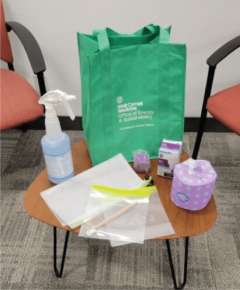Recycling 1 ton of paper saves 17 trees, 7000 gallons of water, 3.3 cubic yards of landfill space, 2 barrels of oil, enough energy to power a house for 6 months.
UnPower Hour, held this past March 21, was an event in which participants switched off as many lights, equipment, and appliances as possible to reduce their energy consumption for one hour. Registrants recruited colleagues and coordinated the event in their work area.
30 Green Leaders joined the event and recruited 210 participants.
Based on the reported actions completed during that hour and energy data, we conservatively estimated we saved 162.5 kW during UnPower Hour. This is equivalent to:
- 290 miles driven by an average gasoline-powered passenger vehicle;
- 7,494 smartphones charged;
- The carbon sequestered by 1.9 tree seedlings grown for ten years.
The results demonstrate that small actions toward reducing energy consumption can significantly impact our carbon footprint.
Congratulations to the three raffle winners (selected by a random number generator) who were gifted a sustainable gift bag:
- Roberto De Gregorio
- Jalia Dash
- Christine Darko
This event was part of Earth Hour 2024, which took place on Saturday, March 23, at 8:30 PM. Earth Hour is a World Wildlife Fund initiative that aims to raise climate change awareness while empowering individuals to help create a tangible impact on the planet.
To help WCM conserve energy throughout the year, there are several actions you can take:
- Switch off lights when you leave. You can post switch-off stickers to remind colleagues to do so.
- Adjust your computer settings:
- Program your monitor shut off after 5 minutes of inactivity;
- Enable computer sleep mode after 20 minutes of inactivity;
- Decrease monitor brightness.
- Switch off your desktop or laptop at the end of the working day, or at least during the weekend and when you leave for time off.
- When possible, switch off other equipment if not in use (Note: For sensitive equipment, check with the manufacturer). You can use outlet timers to set equipment to turn on in the morning before you get to work and to turn off automatically at night.
- Use shared printers/scanners.
- Use LED lights.
- Choose Energy Star appliances and electronics.
- Reduce energy from water heating by decreasing water temperature.

Testimonials:
Divya Bhatia, Instructor of Immunology in Medicine: “Energy saving can have a significant impact and make a huge difference by preventing climate change and preserving our planet in the long-term. Therefore, I very much applaud this initiative by Office of Energy & Sustainability of WCM, and I have participated in this before as well.”
Carolina Trujillo, Senior Research Associate in Microbiology and Immunology: “We found out where the light switches are located on our floor. We confirmed most of our equipment can be shut down when not in use. The volunteers were happy to participate. People understand this is a proof of concept, and we can do better when we are aware of energy conservation.”
Noemi Linden, Graduate Student, Medicine, Infectious Diseases: “Thanks so much for this initiative. We had a lot of fun participating!”
Melanie T Wilson-Taylor, Assistant Professor of Clinical Pediatrics: “We actually limit the amount of lights used on most days in the main suite (using the natural light from the windows), always turn off all remaining lights at the end of each work day. We use standby mode, so the screens turn off when not in use, and the computers go into sleep mode. We have one shared printer for our suite, and put our fax machine in standby mode. We use a filtered water system and use reusable water bottles on most occasions. We participate in the paper recycling program for our suite. We were happy to participate in this energy-saving activity.”
